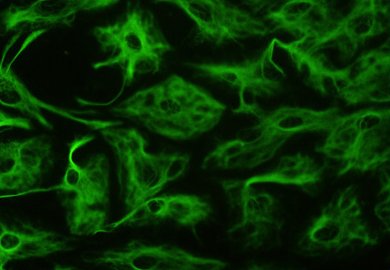Time magazine’s “Healthland” blog featured an entry this morning entitled “MIT Scientists Develop a Drug to Fight Any Viral Infection.” Considering the usual level of exaggeration in science journalism, I was really excited to find out that this is based on some pretty solid research.
Of course, as most science articles do (based on anecdotal evidence, to be fair), this one includes, as its second-to-last line, the caveat that the researchers “hope to license the technology for trials in larger animals [and] someday in humans.” So, you’re not likely to see it on shelves tomorrow. Still, to be fair-if-cynical, something that could be as profitable as this, if it does work out, should see further research soon enough.
A habit I’ve picked up over the past few years (and one I hope I can instil in others) is immediately scrolling down until I find the actual peer-reviewed, published research the story is based on (In this case, free! Available to anyone with internet! This is sometimes a glorious age indeed.)
Now, unlike the last paper I talked about here, this one is difficult to get through without at least a little background in the field, so I wouldn’t necessarily suggest that you do so. Even though viruses aren’t my thing, I’ve had enough basic biology and physiology in the last two years that I was able to muddle through with the help of coffee and quiet.
The treatment revolves around inducing cell-suicide among infected cells, and leaving healthy cells alone. This is really, really cool. There are a lot of ways in which your body fights infection. One of these ways is programmed cell death, or apoptosis (which is a way too silly-sounding word to mean what it does, if you ask me).

I found this by chance while googling apoptosis (click the image for the original site). I kind of love it. Biology is basically this: a Rube Goldberg machine that works with extraordinary efficiency, unless or until it doesn't.
Apoptosis is triggered by other cells and chemical pathways that aren’t necessarily relevant to what I’m talking about here–suffice it to say that it is a way to get rid of old cells and destroy infected cells. It happens naturally–your body needs to get rid of cells at the end of their life cycle in an efficient and non-traumatic way. Continue reading


